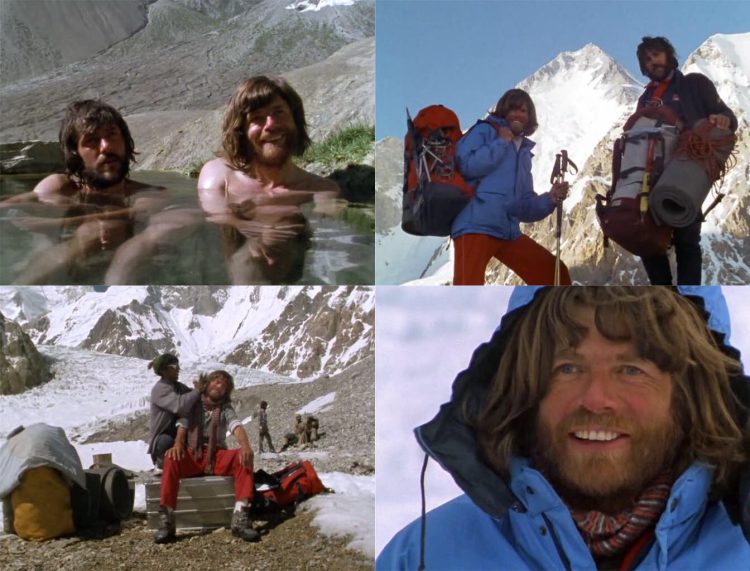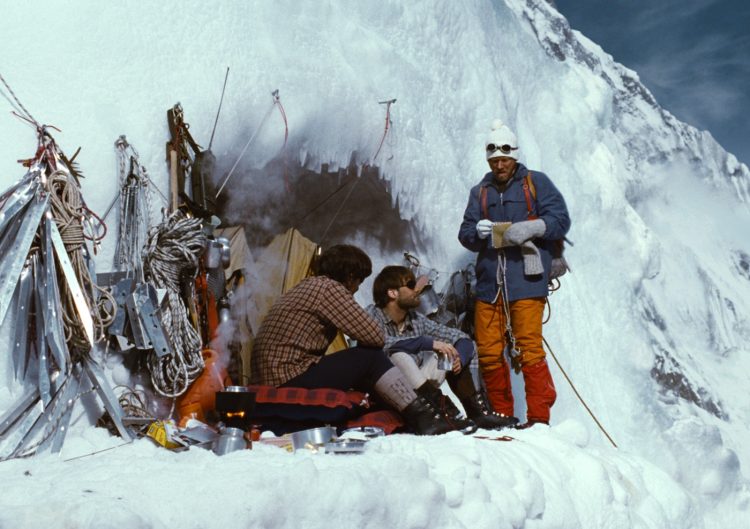The legendary first ascentist Reinhold Messner lost his brother and friends in the mountains, but found himself by overcoming his fear of loneliness.
From Messner’s book, “Alone on Nanga Parbat”:
“…I am alone again. With incredible effort, I move forward. Digging through the thigh-deep snow becomes impossible. After three hours of backbreaking labor, I realize I will never reach the summit. And going down is impossible… I have to choose between life and death. The summit, which only yesterday so strongly attracted me, becomes indifferent to me… The thought that I will still fail does not leave me even in these last snowfields. But there is also faith that the summit will ultimately be reached.”
Legendary mountaineer Reinhold Messner is the first person in the world to have conquered all eight-thousanders and made his first ascent of the highest peak in the Geisler Alps at the age of five. Reinhold never sought fame for its own sake and was unafraid to ruin his image as an unrivaled hero. He likely simply doesn’t consider himself one, as his greatest victories came at the cost of irreversible losses and defeats. Striving for the summit, he learned to retreat. Messner once said: “I have failed in 11 Himalayan expeditions and survived only because I always knew when to stop.”
Messner never cared about public opinion. He frankly admitted that he had no intention of planting the Italian national flag on the peaks he had conquered, because he conquered mountains only for himself, and not for the prestige of his native country. “My handkerchief is my flag,” Reinhold openly declared, and calmly endured the torrent of discontent in the press. And to the journalists’ signature question, “What do you do for society?” he answered frankly: “Nothing.” On the contrary, I pose a danger to a respectable, fearful, and unimaginative society.”
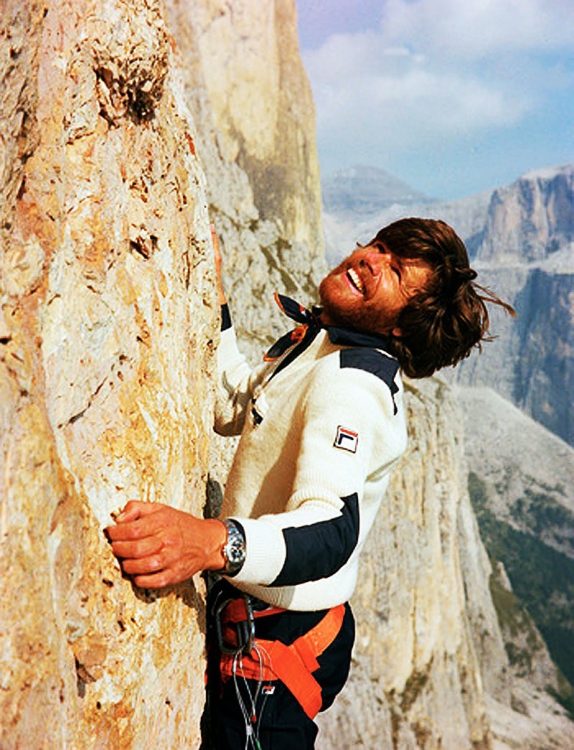
Tragedy on Nanga Parbat
MV Reference: Nanga Parbat is the ninth-highest eight-thousander in the world (8,126 m). Located in the northwest Himalayas, it is one of the three most dangerous peaks to climb. Glaciers flowing from the Nanga Parbat ridge to the northwest include the Diamir, Rakiot, and Buldar glaciers; to the east and southeast, the Khongra, Tarshing, Rupal, and Rama glaciers. The Rupal Face is the highest big wall in the world, at 4.5 kilometers.
Reinhold Messner initially established himself as one of Europe’s most daring and innovative mountaineers, much like the great Hermann Buhl, who became the first to reach the summit of the inaccessible Nanga Parbat in 1953.
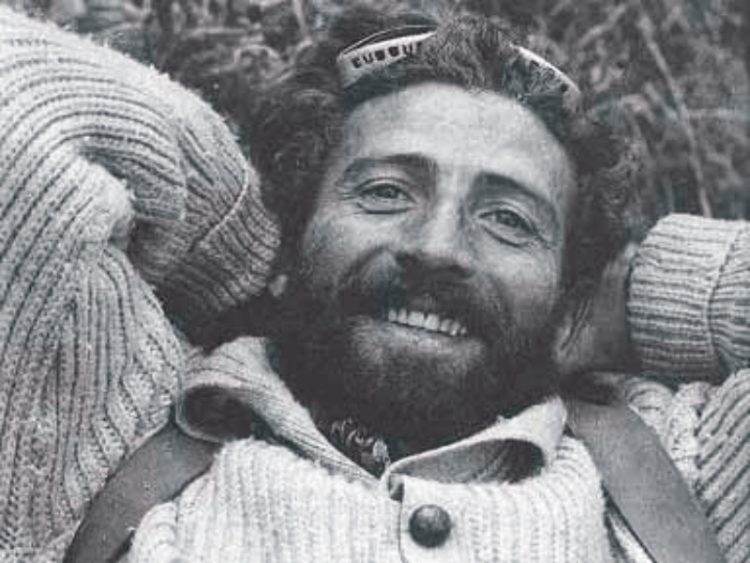
It is symbolic that Messner, like Buhl, was destined to go to Nanga Parbat on the expedition of Dr. Karl Herligkoffer, who was literally obsessed with the “killer mountain.”
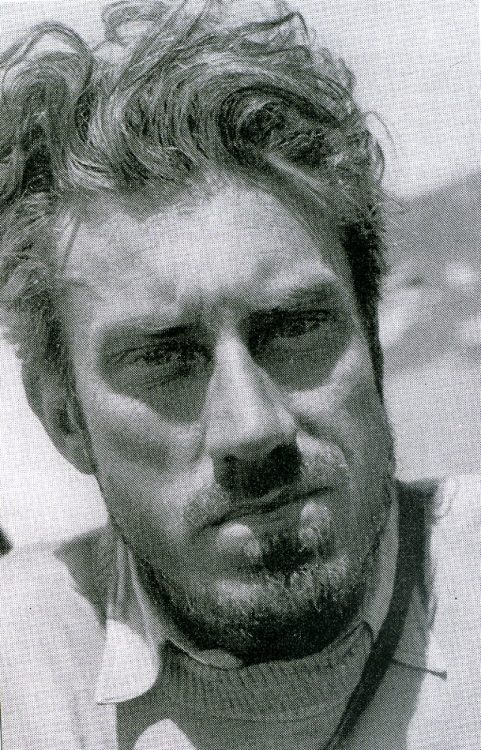
Frankly, Messner wasn’t particularly eager to take part in a large expedition where he personally knew only a few climbers. Moreover, Herligkoffer’s reputation as a leader was rather ambiguous, as Hermann Buhl’s triumph had earned him a bad reputation. After all, Buhl conquered Nanga Parbat not thanks to Herligkoffer, but quite the opposite – against his will! When Herligkoffer, sitting below in base camp, gave the all-clear, Buhl ignored his leader’s orders and set off on his own with his partner. He climbed the last 1,300 meters to the summit alone. And Nanga Parbat was conquered. However, Hermann overestimated his strength. On the descent, it became clear he wouldn’t be able to return to the tent before dark. As a result, he had to stand on a narrow step all night—at an altitude of about eight meters.and kilometers! Fortunately, the weather was windless, and Buhl escaped with frostbitten toes. He only made it back to base camp by a miracle—below, he was already presumed dead. Herligkoffer gave the victor a cold reception, which, however, didn’t stop him from reaping the rewards of his triumph. After all, he had exclusive rights to cover the expedition in the press!

Understandably, Reinhold and his brother Günther weren’t exactly thrilled by the prospect of climbing with such a man. But the temptation to reach the summit of Nanga Parbat via the unclimbed Rupal Face was too great. And in the spring of 1970, the Messner brothers joined Karl Herligkoffer’s Himalayan expedition.
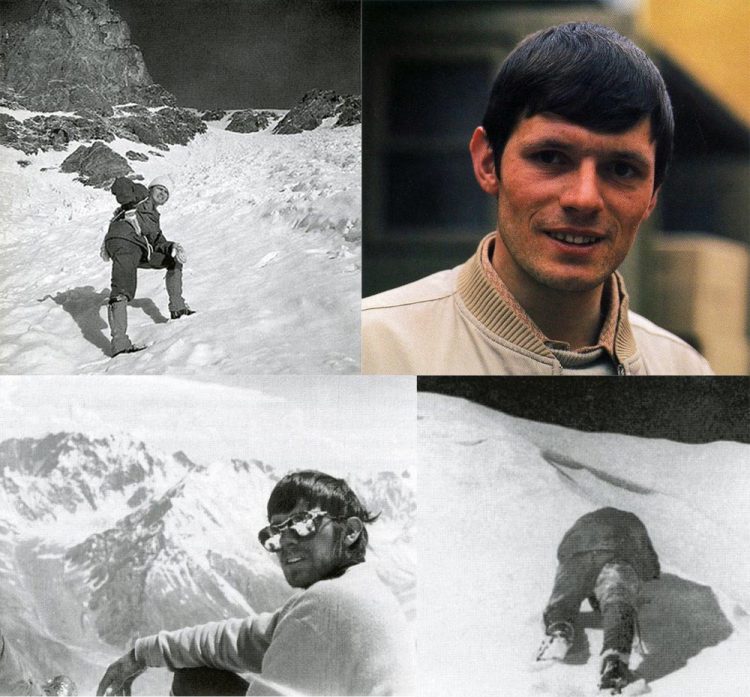
Reinhold and Günther were initially irritated by Herligkoffer’s sluggishness. The brothers were impatient and dissatisfied, and their leader was unable to take control of the situation. In short, history repeated itself with Buhl. After a long period of nervous tension and arguments during which the bad weather continued, Herligkoffer, as he had in 1953, ordered the climbers to descend, abandoning the decisive assault on the summit. However, Reinhold sent Dr. Karl to the same place Buhl had gone 17 years earlier.
The agreement was as follows: if the weather forecast was bad on the morning of the ascent, Herligkoffer would fire a red flare, and then Reinhold would set out to storm the summit alone. If all goes well, a blue rocket will be launched from base camp, and the brothers will ascend together. But a series of unimaginable mishaps occurred. June 27th was promised to be a glorious day, but instead of a blue rocket, a red one was launched from base camp. Perhaps due to incorrect markings. And at 3 a.m., Reinhold sets off for the summit, alone, without a rope.
And after a while, Günther, seeing that the weather is fine, can’t resist and follows him. Of course, also without a rope. But all goes well, and at 5 p.m., the brothers experience double success. They are together and hugging at the summit! However, on the descent, Günther developed altitude sickness, and it became clear that without a rope, they couldn’t descend the ascent route. They were forced to spend the night on the Merkl Col without a tent, food, or water. And on the morning of June 28, Kuehn and Scholz, who had set out after the brothers, heard Reinhold’s cries for help, but they misunderstood, thinking Reinhold was simply greeting them, and passed them by, literally a hundred meters away! During the difficult descent, Reinhold went ahead to scout a way through the crevasses, and when he returned, instead of Günther waiting for him, he saw the enormous cone of a fresh avalanche. Unable to believe his eyes, Reinhold desperately searched for his brother, but to no avail. In his book about this ascent, he later wrote: “A thin line separated me then from death and madness.” After a fruitless night search, Reinhold descended into the valley with frostbitten fingers. However, some expedition members blamed him for Günther’s death, believing that Reinhold had sacrificed his brother for the glory of the climb. It was only 35 years later, in 2005, when Günther’s remains were finally discovered, that Reinhold’s account was confirmed. After that tragic climb, a bitter legal battle ensued between Messner and Herrligkoffer. In 1971, Reinhold was forced to pay Herrligkoffer a fine for publishing the book “Red Rocket on Nanga Parbat” for violating the expedition publication agreement. Despite the fact that it was the expedition leader who fired that fateful red rocket…
Love and the Mountains
1970 in fullMessner’s life changed dramatically. After the tragedy on Nanga Parbat, Reinhold was going through a real crisis, and at that moment he received great support from a wealthy West German aristocrat, Baron von Kienlin, who had played a minor role in that ill-fated expedition. He invited Messner to relax at his castle in Württemberg. This good intention backfired, causing Messner to fall in love with the baron’s young, beautiful wife, Uschi, who ultimately left her husband and three children for Messner. A year later, Reinhold and Uschi married and set out together to search for Günther’s body in the Diamir Valley. But nothing was found. Messner’s love for Uschi overwhelmed him to such an extent that he lost control of himself. But he still couldn’t sacrifice his passion for conquering new routes and peaks for his wife. And what happened next was inevitable. Messner paid dearly for his devotion to the mountains. In 1977, Uschi left him… In his book, Messner sincerely admits that he had never loved anyone so much: “I don’t know why I was so captivated by the idea of climbing alone again. After all, a year ago, I thought I had given up on this idea once and for all… Separation from Uschi plunged me into such a deep depression that I was completely at a loss. Yet I had not forgotten Uschi. I couldn’t and didn’t want to. Sometimes, waking up at night, I felt very lonely. At first, each awakening was as painful as the separation itself. But when I decided to live alone and accept fate as it came, I freed myself from despair and self-pity, from the fears and doubts of a solo ascent…” .
Perhaps it was fate: first Nanga Parbat brought Messner to Ushi, and then it seemed to pull him back… Only a few years later did Reinhold meet his new, devoted companion, Nena, who later wrote in her diary: “After his divorce, Reinhold lives, walled off from everyone. It’s difficult to break through this wall. Only occasionally does he allow a glimpse into his inner world.”
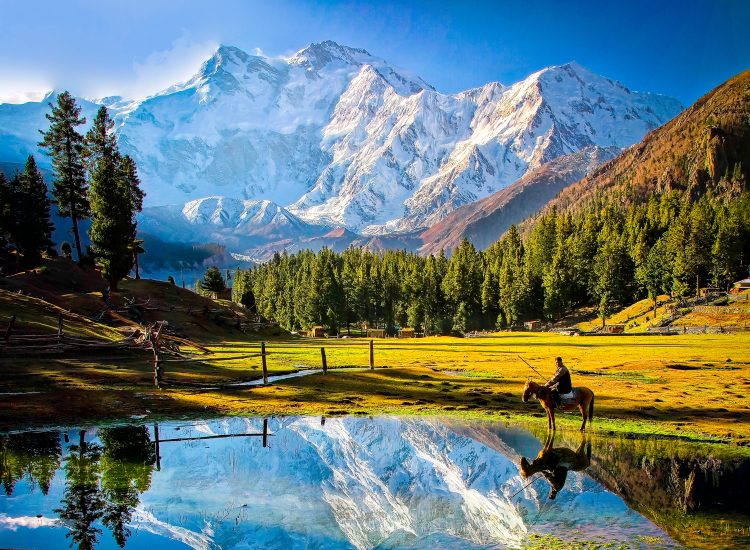
Nena also came to Messner by fate. The girl met him in an ordinary, crowded café: “There wasn’t a single free seat, and I was about to leave when I suddenly noticed a pair of eyes fixed on me,” Nena wrote in her diary. “The man smiled amiably and said, ‘Sit down and have dinner with us.’… An irresistible force drew me toward him… We talked well past midnight… And the next evening, in a taxi on the way to the restaurant, Reinhold pulled me close and said, ‘I love you.’ ‘It’s strange,’ I thought, ‘you don’t know me at all.’” Having walked hundreds of kilometers in the mountains with him and reached numerous peaks, Nena, with purely feminine sincerity, described the stern nature of the great Messner, who had already become a kindred spirit to her: “The tirelessness of this man cannot be described in words… The phenomenon of Reinhold is that he is always on edge, although his nerves are in perfect order. He gives the impression of being in a perpetual hurry. And when we finally reach some peak, it turns out we still have time to descend… This impulse is his essence… It lifts him to the clouds and destroys him at the same time…”
Messner, however, noted with satisfaction the profound personal growth of his companion, noting that, having gone through so many hardships and trials with him, Nena had learned to restrain her emotions and enjoy peace.
Fear of Loneliness
“You just got back, what’s the need to go somewhere again right away?” Messner’s father and friends constantly asked. “You’ve already achieved everything,” people insisted. “I haven’t exhausted all my possibilities yet,” Reinhold replied, but no one understood him. In Europe, he was known as a showman, but Reinhold tried not to take it personally. He wanted to decide his own fate, even if it meant running into the envy of those who called themselves “friends of the mountains.” The constant glare of the spotlights tormented him far more than even the most difficult climbs.

Messner wrote: “Fear is our constant companion. But it is impossible to live actively without fear.” And after his solo ascent of Nanga Parbat, he stated: “I have achieved more in mountaineering than I could have wished for.” He declared his ascent “the first absolute solo ascent of an eight-thousander via a new route.”
“I MUST BE FIRST!”
When Messner learned that Japanese climber and explorer Naomi Uemura had received permission to solo Everest before him, he was overcome with despair. Because he had secretly been hatching this idea himself, and it had never even occurred to him that anyone could beat him to it! Messner couldn’t allow this to happen. And yet, he came up with a solution. In 1980, he became the first climber in history, who climbed Everest solo, alpine style—without oxygen, without rope or pitons, without prepared bivouacs along the route, without a safety team, and without a radio—during the monsoon season. A time of year when an expedition to the Himalayas was considered unthinkable!
And that year, he received a significant letter from his mother, essentially a blessing. “Dear Reinhold! I am writing to you in Tibet, although I don’t know if my letter will reach you. After all, you live in a completely different world… I know you can’t help but be careful! Ten years ago, you were with Günther on Nanga Parbat, and I hoped it was the last time. But you went back to the mountains, and despite everything, I didn’t stop you. I don’t do that now either. I understand your way of life better and better… Stay in Tibet. But be careful. I I think about you all the time… Your mother.”
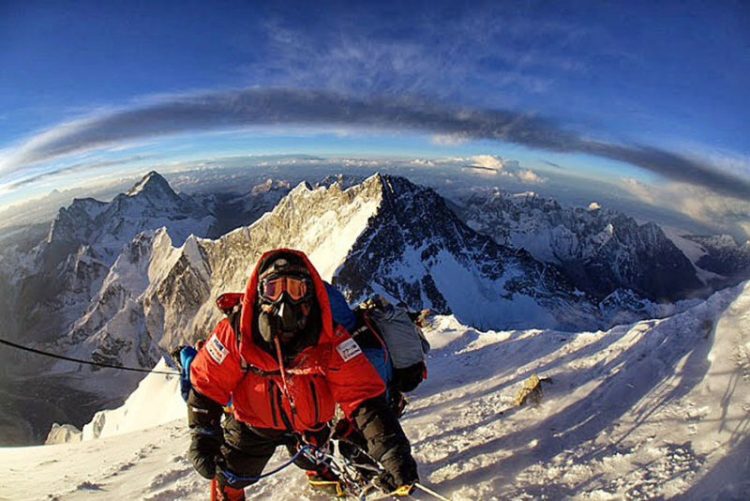
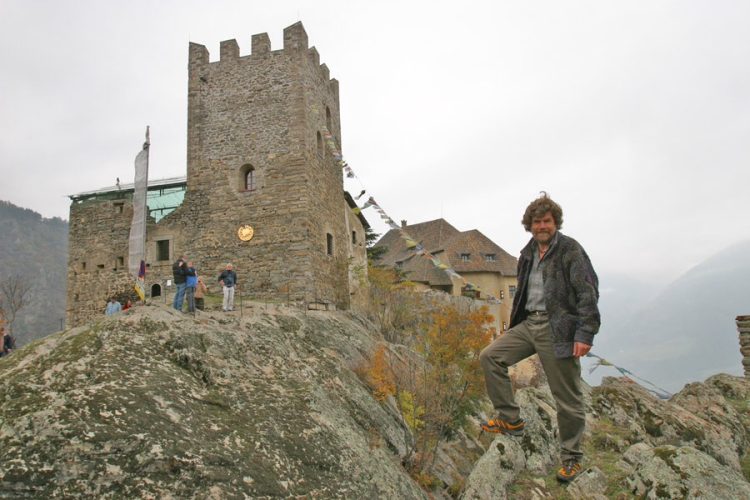
Source of the article: alp.org.ua


